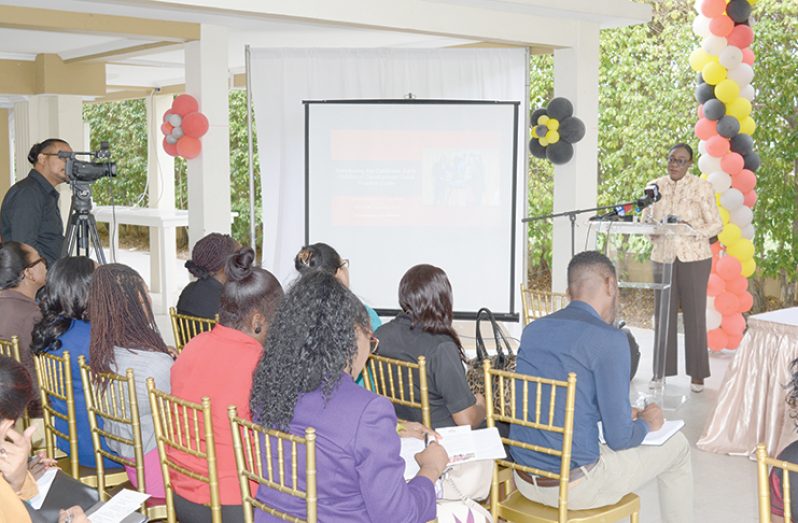– in addressing early childhood development
TACKLING early childhood development is a cross-cutting exercise, and achieving successful outcomes will rely heavily on multi-agency collaboration and solidarity.
That’s according to Minister of Education, Dr. Nicolette Henry, who made the observation on Thursday during the opening of a two-day National Sensitisation workshop on the subject of early childhood development.
Minister Henry said that capacity building will not only improve Guyana’s performance, but also enhance its ability to function, and continue to stay relevant within the context of a continually changing and evolving education system.
“To those of you who are taking part in this workshop, you will gain the additional knowledge which is necessary to achieve the government’s mandate of Quality Education for all,” she told the gathering of education officials.
She said that it is light of the ministry’s current policy that early childhood educators are being asked to have a thorough understanding of child development and early education issues, and provide rich, meaningful educational experiences for all children and families in their care.
Underscoring that accountability for outcomes is high, and that resources for professional support are not infinite, the Education Minister said as such, the early education field needs well-conducted empirical studies on which to base professional development practices.
Therefore, she said the extensive and detailed process undertaken by the stakeholders to develop this guide is important in offering research directions.
“The Caribbean Early Childhood Development Good Practice Guide is designed to assist education policymakers, planners, officers and practitioners in the field to design and deliver good quality care and learning experiences for children in Guyana and across the Caribbean,” the Education Minister said.
As she went on to explain, participants will be provided with a platform to learn comprehensive evidence-based good practices which have been sourced from 17 countries in the Caribbean, including education representatives from such international agencies as CARICOM, the Caribbean Development Bank (CDB), the Organisation of Eastern Caribbean States (OECS), and UNICEF.
PROVEN RESEARCH
The Ministry of Education, she said, is acting on this proven global and regional quantitative research which demonstrates tangible results, by capturing and shaping a child’s early educational development in a safe and nurturing environment.
“The importance of investment in education at an early stage cannot be over-emphasised,” Minister Henry said, adding:
“The knowledge, skills, and practices of early childhood educators are important factors in determining how much a young child learns, and how prepared that child is. “Recent studies of early childhood education demonstrate that it is one of the smartest investments a government can make.”
The increased investment in the education sector, she said, will increase the potential success of a child’s academic career, and in so doing lead to an increase in future potential earnings as a responsible adult.
As such, she said, it is imperative that the education system produce young adults who are globally competent, prepared and ready to create Guyana’s diverse positive economic growth in the 21st Century and beyond.
Chief Education Officer, Marcel Hutson said a synergistic approach between the Ministries of Health, Social Protection, and Education and other Ministries are needed, since education delivery cannot be confined to one sector if it is to function effectively.
He said standards will enhance the learning outcomes for students, and that as educators, it is important to fulfill those standards that are set on a policy level.
“Every person is born gifted, and therefore it is incumbent upon us to do everything within our power to ensure that each child fulfills their potential and purpose,” he said, adding:
“No child is born dunce or is a waste; it is for us to find ways, the means, strategies, methodologies, mechanisms that will cause those children to really fulfill their potential.”
Hutson explained that many children have a problem with literacy, because they may have missed a fundamental period when their brain is wired to internalise concepts at that very early stage of their development.
Here in Guyana, he said, some 90 per cent of children of a certain age are attending nursery school, which is commendable.
He said thet setting the platform for every child to take off is important and doable, with a viable curriculum with appropriate methodologies.



.jpg)









